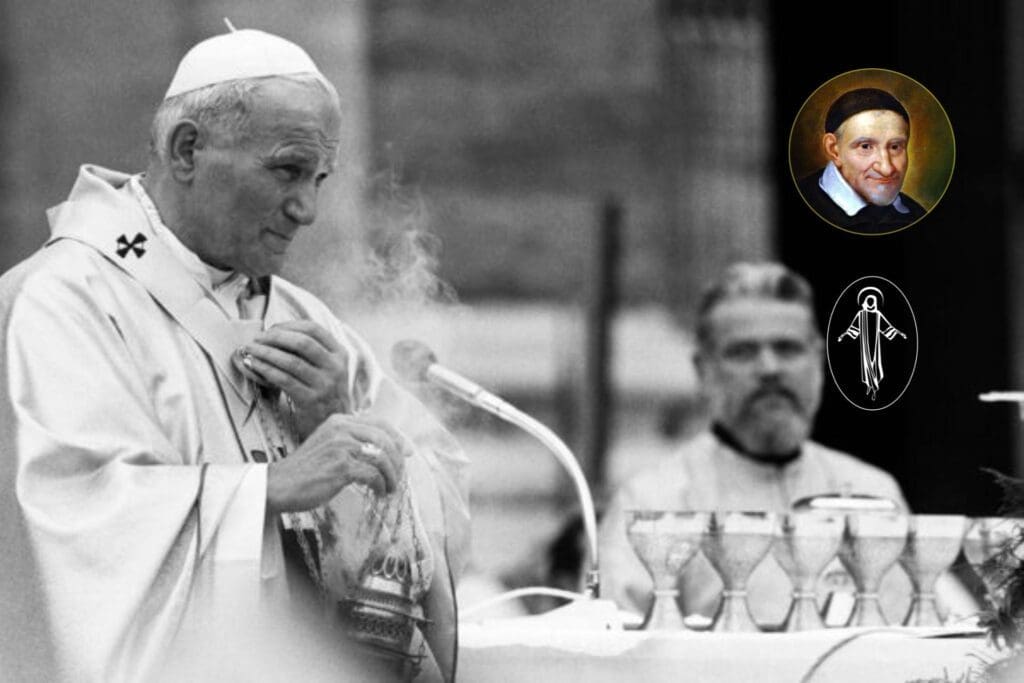
The Jubilee and the Call to Vocation
As the Church prepared to celebrate the Great Jubilee in the year 2000, a time of deep reflection and spiritual renewal, the message of vocation emerged powerfully, inviting all believers to rediscover and reaffirm their unique call in service to God and community. This Jubilee period, which marks significant moments in salvation history, becomes an opportunity to reflect on the centrality of the Eucharist as the source of every vocation. In this context, the words and teachings of spiritual figures such as St Vincent de Paul and John Paul II take on special significance, guiding us in understanding and deepening our response to the divine call. Looking forward to the forthcoming Jubilee of 2025, let us draw on the past to empower the future!
John Paul II’s message for the XXXVII World Day of Prayer for Vocations has as its theme “The Eucharist, source of every vocation and ministry in the Church”. In his message, the Holy Father reflects on the centrality of the Eucharist as the source of every vocation in the Church. He emphasises how the Eucharist is the mystery of Christ alive and at work in history, through which Jesus continues to call people to follow him and offer them the “fullness of time”. The message also explores the role of the Eucharist in discovering and sustaining the divine call, the importance of vocational witness and the invitation to respond generously to the divine call.
Three reflections on the message:
The Eucharist as a source of vocation: The Eucharist is not only a sacrament, but also a source of inspiration and guidance for those seeking their vocation in the Church. How can we deepen our understanding of the Eucharist to discover and sustain our vocation?
The response to the divine call: John Paul II emphasises the importance of responding generously and courageously to God’s call. How can we prepare and form ourselves to fully respond to this call?
The role of the community in vocations pastoral ministry: The community plays a crucial role in supporting and nurturing vocations. How can we, as a community, become more active and intentional in promoting and sustaining vocations in the Church?
Now, based on this message, we can explore the missionary and priestly vocation in the light of the teaching of St. Vincent de Paul and the missionaries of the Congregation of the Mission.
St. Vincent de Paul gave his life to a single purpose_ to serve the poor and marginalised in a tireless manner. His life and mission were deeply rooted in his relationship with God and his understanding of the Eucharist as the source of every vocation and ministry in the Church.
St Vincent and the Eucharist:
St Vincent de Paul had a deep devotion to the Eucharist. For him, the Eucharist was not only a moment of communion with Christ, but also a source of inspiration for his mission. He saw the Eucharist as a moment when Christ gives himself completely to us, and in response, we are called to give ourselves completely to others, especially those most in need. This understanding of the Eucharist as a total gift of self deeply influenced his vision of the missionary and priestly vocation.
The missionary vocation:
The missionaries of the Congregation of the Mission, following the example of St Vincent, are called to live a life of total self-giving to God and the poor. Their missionary vocation is rooted in their Eucharistic relationship with Christ. Through the Eucharist, they are invigorated and inspired to take the message of Christ to the ends of the earth, serving the poor, the marginalised and the spiritually hungry.
The priestly vocation:
The priesthood, as emphasised by John Paul II in his message, is a unique vocation that requires a generous response to God’s call. St Vincent de Paul saw the priesthood as a means to serve God through service to others. For him, the priest was one who, nourished by the Eucharist, became a channel of God’s grace to the world, bringing Christ to those in spiritual and material need.
Conclusion:
St Vincent de Paul’s vision of the missionary and priestly vocation, illuminated by John Paul II’s message on the Eucharist, gives us a profound understanding of the central role of the Eucharist in the life of a Christian. Whether we are called to priestly, religious or lay life, the Eucharist must be the source from which we draw our strength and inspiration, guiding us on our journey of fidelity to God’s call.

